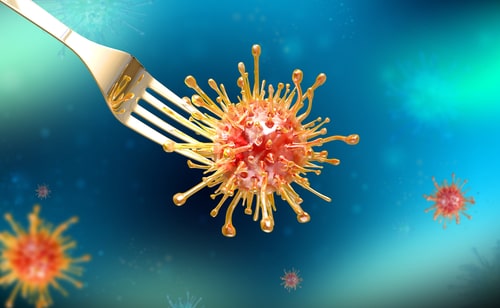You May be Sick Because a Restaurant Broke One of These Food Safety Laws
 It has become very clear over the past several years how critical proper sanitization in restaurants is. Viral and bacterial infections can easily be passed from person to person in an eatery environment where multiple people may handle a customer’s food. Aside from infections that are transmitted from person to person, pathogens contained in improperly handled food have the potential to make a restaurant customer very sick with food poisoning.
It has become very clear over the past several years how critical proper sanitization in restaurants is. Viral and bacterial infections can easily be passed from person to person in an eatery environment where multiple people may handle a customer’s food. Aside from infections that are transmitted from person to person, pathogens contained in improperly handled food have the potential to make a restaurant customer very sick with food poisoning.
Food poisoning can be more than just drastically unpleasant - it can endanger a person’s life, particularly if they have health conditions making them more vulnerable than most. For this reason, the state of Michigan has set out strict legal rules that apply to most establishments serving prepared food. These guidelines are designed to ensure that food is stored, handled, and prepared in a manner that is safe and unlikely to render diners ill. If you have suffered food poisoning after eating in a restaurant, you may be entitled to compensation. An attorney can help you pursue this special type of personal injury case.
Essential Food Handling Regulations for Michigan Eateries
Restaurants have a duty to ensure that their staff members are following all relevant food safety laws. Failing to follow regulations as set out by the Michigan Food Code even once can pose a serious threat to the health and safety of the public. If you became sick after eating food from a restaurant, it may be because the establishment broke an important regulation such as:
- Handwashing - Anyone handling food is required to wash their hands correctly at certain points, such as after touching a nonsterile surface or object, including uncooked food, and before handling food products.
- Sourcing - There is a set of legal rules governing which sources proprietors of food establishments may permissibly purchase food products from. Serving food obtained from an illegal source may greatly reduce the risk of a contamination incident.
- Temperature control - It is critical that perishable foods are kept either cold enough or hot enough to inhibit bacterial or viral growth. Foods that are not kept adequately cold or adequately hot may rapidly develop dangerous pathogens that can sicken those who eat it.
- Cross-contamination - Cross-contamination can occur when certain foods are not stored separately and in sealed containers. Bacteria can spread between cooked and uncooked food or between different types of food, such as meat and vegetables. For example, if broccoli is stored where it is exposed to raw chicken, the broccoli may become contaminated.
Often, a food poisoning incident can be traced back to a failure to comply with a food safety regulation. When this is the case, the restaurant may be considered negligent and held liable for your illness and its associated expenses.
Contact a Michigan Food Poisoning Lawyer
John D. Tallman, PLC, Attorney at Law is skilled in investigating food poisoning cases to determine what type of negligence may have led to your illness. Our experienced Grand Rapids food poisoning attorneys will strive to secure an award or settlement on your behalf that fully compensates you for all your costs and losses related to the incident. Contact us at 616-361-8850 for a free consultation.
Source:
https://www.michigan.gov/-/media/Project/Websites/mdard/documents/food-dairy/laws/mi_modified_2009_food_code.pdf?rev=f69c9a99cc3248bf953c37e782e6e1f7








